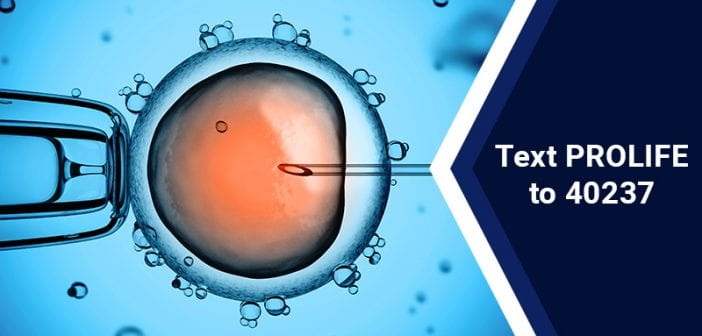Since the first successful use of in-vitro fertilization just over 40 years ago, researchers have continued studying living human embryos, ostensibly to gain a better understanding of human development. The biotech industry established guidelines dictating that any embryo created and used for research purposes must be killed by 14- days post-fertilization, creating what is known as the “14-day rule.” Tragically, that anti-Life guideline has been discarded for a more extreme position, allowing researchers to manipulate and destroy embryos without any time limit, leaving the Lone Star State with no biomedical laws protecting nascent human beings.
The 14-day rule, or the “Warnock rule”, was established in 1984. This seemingly arbitrary time frame was chosen to end the embryo’s life right before the development of the “primitive streak”, when an observer can first distinguish the front of the embryo from the back. This guideline seldom mattered, as researchers have historically been unable to keep embryonic humans alive past eight or nine days because human Life is not meant to live in a petri dish. Human Life begins at fertilization, regardless of where the fertilization occurs. Embryos are meant to implant in a woman’s uterus seven days after fertilization and safely grow there, following the natural course of development. These embryos for research are intentionally created only to be used and destroyed, an appallingly anti-Life practice.
Since this guideline was originally established, technology has developed rapidly, and some researchers have found themselves running up against the 14-day limit, even able to sustain embryonic Life in the lab beyond 14 days. The ability of scientists to sustain embryonic Life in a lab beyond 14 days led ethicists and scientists to argue that the 14-day limit is antiquated and must be extended. Now, these demands are actually being taken seriously.
The International Society for Stem Cell Research (ISSCR) introduced new guidelines for embryonic research in 2021. In order to promote research that would “yield beneficial knowledge that promotes human health and well-being”, the new ISSCR guidelines would allow the study of embryos beyond the 14-day limit. The only limitations advised are the use of a “minimal number of embryos” and ethical oversight to decide that extending an embryo’s life is necessary.
According to Aryeh Warmflash, a stem-cell biologist at Rice University in Houston, “it was a good choice not to frame this around advocating another ‘X-day’ rule.” Sadly, many other scientist and ethicist committee members agree with Warmflash that removing concrete ethical limits is a good thing. With the new standard of oversight and review conducted exclusively by like-minded scientists, all in pursuit anti-Life goals, Pro-Life advocates are dubious whether these checks and limits will happen often enough. The progression toward removing specified quantitative limits on embryonic experimentation is disturbing. There is no way to stop this downward spiral.
Despite this dismaying move by the scientific community, there is some hope. Per the ISSCR, both “broad public support” and “local policies and regulations” must permit for such a change. Pro-Life advocates must fight to protect innocent human Life against the new unethical policies.
Some countries have legally-enforced standards regarding the treatment of embryonic humans. Austria, Germany, Italy, Russia, and Turkey all have bans on any non-medical use of in-vitro human embryos. A number of countries in Europe and Asia have cemented the 14-day rule into law. The United States was actually the first nation to have such a law proposed, but the legislation never passed.
The U.S. does not have any such limits. There are still a few prohibitions on the federal funding of this research, though they have been gradually loosening over the years, leading up to a 2009 executive order by President Obama to allow federal funding of embryonic stem cell research. Despite the poor national baseline, many states have enshrined into law protections for embryonic human Life. Some prohibit state funding of embryo research (Arizona, Nebraska, Illinois), some halt experimentation after implantation age (Maine, New Mexico, Rhode Island), and some ban such research altogether (Arkansas, Illinois, Louisiana, Michigan, North Dakota, South Dakota).
Unfortunately, Texas is woefully behind in enacting biotech laws to regulate these practices, having virtually zero legal limits on embryonic research. This means that embryos are solely and completely beholden to self-imposed industry limits. Clearly, Texas must do better.
Legislation was introduced in the Texas State Legislature in 2019 by Representative Briscoe Cain (R-Deer Park) to prevent groups from using state funds for anti-Life experimentation. Tragically, even this minimum protection for vulnerable embryos failed to receive a hearing.
Texas is ideally situated to be leading Pro-Life fights; we must not lag behind. Using human embryos as in-vitro subjects of study inevitably leads to the destruction and death of these developing human beings. The research industry does not treat them as Life that has value, but rather as research subjects to be used, manipulated, and ultimately discarded and destroyed when no longer useful.
In order to protect these tiny embryos from harm, and to fulfill our goal of protecting innocent human Life from fertilization until natural death, our state must take up the cause of protecting these tiniest and most vulnerable Texans and enact state protections on embryonic research.


